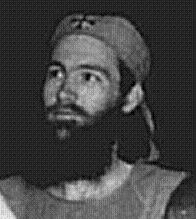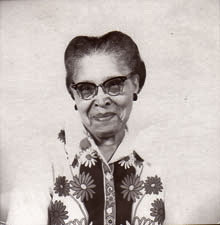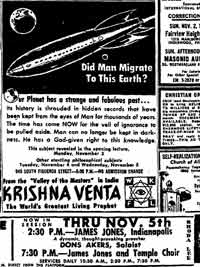 No one who knew David and Gladys Smith could ever comprehend just what it was Gladys saw in her husband.
No one who knew David and Gladys Smith could ever comprehend just what it was Gladys saw in her husband.
For openers, “Big David” – as David Elbert Vester Smith was known during his years with Krishna Venta’s WKFL (Wisdom Knowledge Faith Love) Fountain of the World cult[1] – was 20 years older than his wife and reportedly fairly self-centered.
When the couple belonged to the Fountain, where living arrangements were always sparse, Smith decided it would be healthier for Gladys if she slept on the floor while he took the one couch made available to them. It made no difference to him that his wife was pregnant. After all, the Fountain – where members had taken a Nazarite-like vow[2] to not cut their hair or trim their beards, and to wear robes but not shoes, until world peace had been achieved – was all about sacrifice. And Smith was all for Gladys learning to make sacrifices.
As if Smith’s ego was not enough of an irritant, he freely admitted that he did not like to work and tried to avoid it whenever possible. On one occasion, the man had actually gone to the Fountain’s nurse hoping some minor cuts and scrapes on his hands might get him out of washing dishes. Plus, the thought of keeping a full time job in society literally terrified him.[3]
When Smith and his first wife Marilyn were contemplating joining the Fountain in the 1950s, his fear of responsibility was probably a factor in his decision. It may have also been one of the reasons he and second wife Gladys joined Jim Jones’ Peoples Temple a decade later.
What is interesting, if not ironic, about Smith belonging to first the Fountain and then Peoples Temple is that, in November 1958, advertisements in the Los Angeles Times referring to Krishna Venta as “The World’s Greatest Living Prophet” and Jim Jones (or “James Jones”) as “A dynamic, thought-provoking preacher” had literally been positioned one atop the other in that newspaper.[4]
The paradox of Smith joining the Fountain and then Peoples Temple is that, by doing so, he unwittingly placed himself in environments where he would wind up laboring twice as hard as he would have, had he just taken a job in mainstream society.
Utopias do not build themselves, and Smith would find himself helping to construct two in his lifetime. In the 1950s, he was a part of developing the Fount, an offshoot of the Fountain, which Krishna Venta had opted to erect in the frozen backwoods of Homer, Alaska. Long hours of oftentimes grueling work were an unavoidable part of those homesteading efforts. Twenty years later, Smith must have known instinctively what lay in store for him when he learned of Jim Jones’ plans to relocate Peoples Temple to the wilds of Guyana.
In fact, Smith, of all people, should have seen Jones’ move coming before it happened.[5]
In the 1950s, Smith had followed Krishna Venta – whose real name was Francis Pencovic – a man possessed of what psychologist Len Oakes refers to as “prophetic charisma” (i.e., the magnetic personality one would expect to find in a prophet).[6] Within the framework of a complex and sometimes convoluted message, Venta preached a social gospel of equality, emphasized the dangers of nuclear weaponry in the Cold War era, and predicted an eventual American civil war divided along racial lines. The culmination of Venta’s intricate theology had been the construction of the Alaskan compound to complement the Fountain’s California headquarters.
But Krishna Venta had been assassinated in December 1958 in a suicide bombing that had left a total of ten dead, a number of wounded, and much of the group’s California command center in ruins. With Venta’s death, the spark that had ignited the Fountain was gone, and the group began to steadily lose both its enthusiasm and its members. Also among the casualties was the group’s vision of an Alaskan heaven on Earth. Within a few years, the project was forsaken and the land donated back to the State to Alaska as a wild life preserve.7] The California outpost was all that remained of the Fountain.
Following Krishna Venta’s death, Smith would come and go from the Fountain more than once. The first exit had been in a doomed attempt to save his marriage with Marilyn. When he returned to the Fountain again in the 1960s, it was with new wife Gladys. A few years later, they would both leave the Fountain forever when they realized the group could not long survive Venta’s death.
No one knows the details of the Smith family’s enlistment with Peoples Temple. But in following Jim Jones, a man also endowed with prophetic charisma, Smith may have recognized bits and pieces of the message he had heard years before from Krishna Venta. Present also was the emphasis on bridging the racial divide and evils of nuclear weapons.
However, Venta and Jones were more different than they were alike. For one thing, in place of Venta’s social gospel, Jones preached pure Communism.
In addition, Jones’ sermons and personality both were dramatically darker, far more paranoid and radically more sinister than anything Fountain members ever saw under Venta. Ironically, on its best day, the Fountain’s membership barely totaled one-third of the number of people who died in Jonestown.
Nevertheless, having been a part of Krishna Venta’s vision, Smith should have known that a mass relocation to the backwoods of some desolate part of the world would be an inevitable part of the Jones equation.
What Smith, and everyone else associated with Jonestown, chose to ignore was Jones’ rhetoric about mass suicide, and the tragedy in November 1978 at the small outpost in the Guyanese jungle now seems inevitable in retrospect. The same day that Smith declared himself to be a violent revolutionary during a session of short taped statements, other Temple members pledged their willingness to die for the cause. It was language all of them had heard for years from the pulpit and the rest of the Temple leadership.
On that fateful day, David and Gladys Smith, along with their five children, would all perish. Smith and his wife were 52 and 32, respectively, and their children ranged in age from seven to 13.[8]
Others, meanwhile, had seen hints of what was coming.
A former member of the Fountain reports that, prior to the establishment of Jonestown in Guyana, she and her husband traveled to San Francisco to visit with David and Gladys Smith at Peoples Temple. There, the two couples were forced to visit in a space that bore the atmosphere of a police interrogation room. The Smiths – who seemed petrified of inadvertently veering from some scripted dialogue – were never out of the watchful gaze of an observer who monitored everything they said.
Because of this episode, says the former Fountain member, she was not surprised to hear of the death of her friends in Guyana.
And her friends included not only the Smiths.

Photos Courtesy of California Historical Society, MSP 3800
Also among the dead was shy and retiring septuagenarian Erma Winfrey who literally bore the scars of having been a part of the Fountain before joining Peoples Temple. Winfrey had been at the Fountain on the night of the 1958 explosion and fire that ended Krishna Venta’s life. She had suffered second and third degree burns on much of her body.
In the years after she joined Peoples Temple, Winfrey sent glowing letters to her former Fountain brothers and sisters about how wonderful life with Jim Jones was. Since all outgoing correspondence – especially from Jonestown – was screened by a letter-writing committee, it is unknown if those comments reflected her true, or at least complete, feelings about her life in the Temple.In fact, she was publicly scolded by Jim Jones on at least one occasion: her infraction, according to Jones, was “taking advantage of the new special diet server” and obtaining sugar for her tea.
She had also been classified as having a “very negative” attitude because she had complained when Peoples Temple “didn’t give her money to buy anything in the States.”[9]
Winfrey and Smith went to Guyana seeking deliverance from the United States, a nation Jones had convinced them no longer understood them. In the end, Winfrey, the Smith family, and more than 900 others who’d represented the dream of Jonestown, all lay dead on a tract of land far removed from anything that any one of them would have called home.
(Shawn Sutherland is a graduate of Abilene Christian University, and lives in the Dallas, Texas area, where he has been involved in patent law for the past 16 years. He is currently at work on Barefoot Messiah of the Atomic Age, the definitive biography of Krishna Venta. His book This Night Wounds Time: The Mysterious Disappearances of Stacie Madison and Susan Smalley is due for release this fall. Mr. Sutherland may be reached at shawn_sutherland_1964@hotmail.com.)
